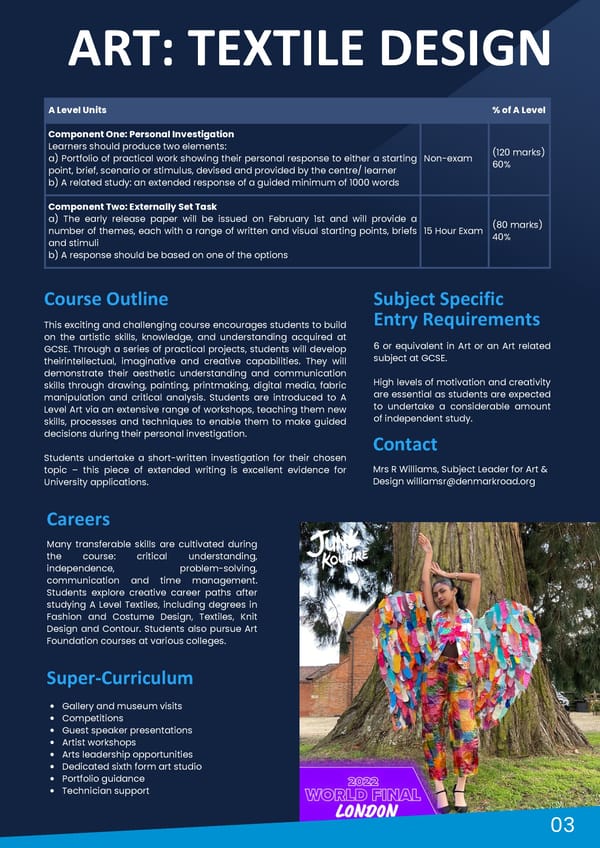ART: FINE ART ART: TEXTILE DESIGN A Level Units% of A LevelA Level Units % of A Level Component One: Personal Investigation Component One: Personal Investigation Learners should produce two elements: Learners should produce two elements: (120 marks) (120 marks) a) Portfolio of practical work showing their personal response to either a starting Non-exam a) Portfolio of practical work showing their personal response to either a starting Non-exam 60% 60% point, brief, scenario or stimulus, devised and provided by the centre/ learner point, brief, scenario or stimulus, devised and provided by the centre/ learner b) A related study: an extended response of a guided minimum of 1000 words b) A related study: an extended response of a guided minimum of 1000 words Component Two: Externally Set Task Component Two: Externally Set Task a) The early release paper will be issued on February 1st and will provide aa) The early release paper will be issued on February 1st and will provide a (80 marks) (80 marks) number of themes, each with a range of written and visual starting points, briefs 15 Hour Exam number of themes, each with a range of written and visual starting points, briefs 15 Hour Exam 40% 40% and stimuli and stimuli b) A response should be based on one of the optionsb) A response should be based on one of the options Subject Specific Course OutlineSuper-CurriculumCourse Outline Entry Requirements This exciting and challenging course encourages students to build Gallery and museum visitsThis exciting and challenging course encourages students to build on the artistic skills, knowledge, and understanding acquired at Competitions on the artistic skills, knowledge, and understanding acquired at 6 or equivalent in Art or an Art related GCSE. Through a series of practical projects, students will develop Guest speaker presentationsGCSE. Through a series of practical projects, students will develop subject at GCSE. their intellectual, imaginative and creative capabilities. They will Artist workshopstheirintellectual, imaginative and creative capabilities. They will demonstrate their aesthetic understanding and communication Arts leadership opportunitiesdemonstrate their aesthetic understanding and communication High levels of motivation and creativity skills through drawing, painting, printmaking, sculpture, digital Dedicated sixth form art studioskills through drawing, painting, printmaking, digital media, fabric are essential as students are expected media and critical analysis. Students are introduced to A Level Art Portfolio guidance manipulation and critical analysis. Students are introduced to A to undertake a considerable amount via an extensive range of workshops, teaching them new skills, Technician supportLevel Art via an extensive range of workshops, teaching them new of independent study. processes and techniques o enable them to make guided skills, processes and techniques to enable them to make guided decisions during their personal investigation. Students undertake decisions during their personal investigation. a short-written investigation for their chosen topic – this piece of Contact Subject Specific extended writing is excellent evidence for University applications. Students undertake a short-written investigation for their chosen Entry Requirements Mrs R Williams, Subject Leader for Art & topic – this piece of extended writing is excellent evidence for Year 12 students also have the unique opportunity to take an Design [email protected] University applications. 6 or equivalent in Art or an Art related additional AS in Art over the year to further enhance their skillset subject at GCSE. (100% portfolio). Careers High levels of motivation and creativity are essential as students are expected Many transferable skills are cultivated during Careers to undertake a considerable amount the course: critical understanding, of independent study. independence, problem-solving, Many transferable skills are communication and time management. cultivated: critical understanding, Students explore creative career paths after independence, problem-solving, studying A Level Textiles, including degrees in communication and time Fashion and Costume Design, Textiles, Knit management. Students explore Design and Contour. Students also pursue Art creative career paths after studying Foundation courses at various colleges. A Level Art, including degrees in Architecture, Graphic Design, Fine Art, Illustration, Game Design, Marketing and Advertising. Students Super-Curriculum also pursue Art Foundation courses at various colleges. Gallery and museum visits Competitions Guest speaker presentations Artist workshops Contact Arts leadership opportunities Mrs R Williams, Subject Leader for ArtDedicated sixth form art studio & Design Portfolio guidance [email protected] support 02 03
 Subject Guide (Sixth Form) Page 4 Page 6
Subject Guide (Sixth Form) Page 4 Page 6